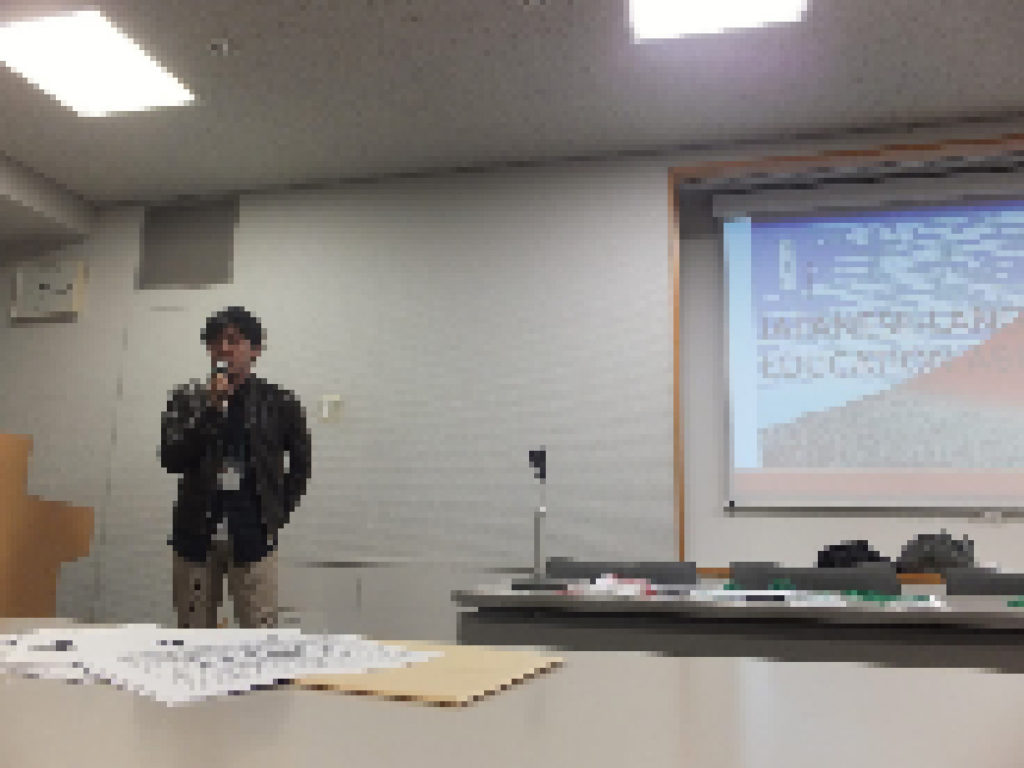::::::::::::::::::::::::::::::::::::::::::::::::::::::::::::::::::::::::::::::::
《 今回のworkshop 》
○workshop参加人数:51名(うち新人の方:1名)
○【前半】:Working mothers or housewives?
○【後半】:JAPANESE-LANGUAGE EDUCATION ABROAD 2018
:::::::::::::::::::::::::::::::::::::::::::::::::::::::::::::::::::::::::::::::::

≪FIRST HALF≫
<Agenda>
Working mothers or housewives?
When I attended the Konshinkai after workshop, one person talked about day-care center.
It reminded me of my childhood. When I was a child, both my parents worked.
It was really rare case at that time, so some people said to me that I was poor child.
But, I don’t think so, because I could go to study abroad several times.
If one of my parents hadn’t worked, it would have been hard to do so. I could improve my English skill because of it.
So, I can enjoy traveling abroad by myself, watching English TV drama and movies without Japanese subtitles and reading English books.
I really appreciate my parents for having these opportunities.
So, I’d like to be a working mother, if I get married and have children.
But, how about other people? I‘d like to know how other people think about it.
That’s why I choose this topic.
<Questions>
Q.1 Is your mother working mother or housewife? What do you feel about it?
Q.2 Please enumerate merits and demerits of working mothers.
Q.3 Please enumerate merits and demerits of housewives.
Q.4 Which do you think is better for you and your family (if you don’t have one, please imagine), working mother or housewife? Why?
Please take all merits and demerits you’ve enumerated into consideration.
I’ll pick some table at random to present the table’s decision and the reason. Please prepare for it.
<Reference 1>
Housewives vs Working Mom: Enough with the Arguing! (excerpt)
https://magdalene.co/story/housewives-vs-working-mom-enough-with-the-arguing
Many working moms do not only provide for their family, they also help society with their ingenuity, educate society with their knowledge,
or improve the quality of lives of many people with policies they create. We should not jump to conclusions,
saying that the children of working moms are in a constant state of neglect.
And of course, in our patriarchal society, we rarely asks workaholic fathers,
“How is your work-family balance?” as if fathers have no stake in childrearing.
Working moms also shouldn’t look down on stay-at-home moms, assuming they are mostly idle, are not intellectually developed,
and can’t produce anything (as if all working mothers produce something).
It’s not easy to manage a household 24/7,
and most of the time those who are involved might not recognize their effort and just take them for granted.
Not working doesn’t always mean being idle all the time.
I was raised by a stay-at-home mom and I never consider her idle, or someone who wasted her education.
Her job was not easy because she had to take care of three children and one husband,
with the help of a housekeeper of varying characters and temperaments.
In addition, she has to manage the family’s finance, supervised workers when we renovated the house.
Just thinking about it makes me want to eat ice cream while having a massage.
The point is there’s no one ultimate decision that fits all mothers.
So keep it nice and peaceful, and enough with the ridicules and the sneering.
If you are happy with your choice then enjoy it! You don’t need to make other people feel insufficient or even guilty for taking a different path.
If you don’t feel satisfied with your decision, try another, and don’t be afraid of being judged by your neighbors or others.
Everything is trial and error, and every mother has her own considerations influenced by many factors that make them different from other mothers.
So let’s all just have a group hug.
<Reference 2>
Anne-Marie Slaughter: Can we all “have it all”? | TED Talk (excerpt)
https://www.ted.com/talks/anne_marie_slaughter_can_we_all_have_it_all#t-231326
If you watch this video, you can know the working mother’s feeling.
So, please watch this video.

≪LATTER HALF≫
<Agenda>
JAPANESE-LANGUAGE EDUCATION ABROAD 2018
To obtain an accurate picture of the current state of Japanese-language teaching around the world, the Japan Foundation(国際交流基金) has been conducting every 3 years a survey of overseas organizations offering Japanese-language courses.
According to the survey conducted in 2018, the number of Japanese Language learners had increased more than that of it in 2015 by 191,749. Additionally, the numbers of Japanese language organizations and teachers reached the highest ones both ever. However, we should understand the state has been conditioned by that of Japan in each era constantly. In other word, the state of Japanese language teaching around the world is always reflecting the characteristics or strength of Japan in the world.
Taking this opportunity, I hope you will think about “why they learn Japanese, and how we should interact with them.” And I believe this topic would be a good trigger for all of you to think about “why we learn English, and how we should interact with people in the world.”
<Reference>
2018年度海外日本語教育機関調査結果 (速報値)
https://www.jpf.go.jp/j/about/press/2019/dl/2019-029-02.pdf
<Questions>
Q.1
Think about why Japanese-language learners start to learn Japanese. Are there different reasons between generations, nations, or times? If so, share your ideas with other members.
Q.2
If the state of Japanese-language teaching around the world keep getting better and better, what kind of benefit or harm would be brought on your life?
Q.3
Have you ever communicated with a Japanese-language learner in Japanese? If you have and have used a special way at that time in order to get communicating with them even easier, share it with other members. If you haven’t, how do you try to communicate with them?
ex)Use foreign talk
※フォーリナートーク(foreigner talk)…その言語に習熟していない人でも理解できるように配慮した話し方。ゆっくり話す、簡単な単語や表現を用いる、文章を短くするなど。
Q.4
If you had a mission to increase the number of Japanese-language learners in some country, how would you do? Present your strategy through making an assumption about the target country.
(Please prepare for presenting your group’s idea of Q.4)
ex1.) Making the manga only using Hiragana and Katakana for the young in European countries because it is assumed that Chinese characters is considered difficult for them in learning Japanese. If they know Chinese characters are not necessarily needed in learning Japanese, it would be able to increase the number of Japanese-language learner. In that respect, manga is very popular in European countries and seems a good tool to be a trigger for them to start to learn Japanese.
:::::::::::::::::::::::::::::::::::::::::::::::::::::::::::::::::::::::::::::::::
私たちと一緒に英語コミュニケーション能力を鍛えませんか?
ご興味を持たれた方は、
入会申込フォーム
https://english-speaking-club.com/cms/?page_id=93
よりお申し込みください。お待ちしています。
:::::::::::::::::::::::::::::::::::::::::::::::::::::::::::::::::::::::::::::::::